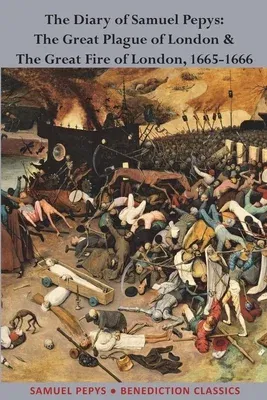On April 30th, 1665 Samuel Pepys wrote "Great fears of the sickenesse
here in the City, it being said that two or three houses are already
shut up. God preserve as all!"
After these fateful words there ensued the Great Plague of London,
followed swiftly by the Great Fire of London. Twenty months later, he
concluded 1666 with "Thus ends this year of publick wonder and mischief
to this nation, and, therefore, generally wished by all people to have
an end... publick matters in a most sad condition; ... the City less and
less likely to be built again, everybody settling elsewhere, and nobody
encouraged to trade ... and all sober men there fearful of the ruin of
the whole kingdom this next year; from which, good God deliver us!" But
his last word is "One thing I reckon remarkable in my owne condition
is, that I am come to abound in good plate, ...".
While perhaps as many as 100,000 perished and the rich fled London in
the face of the plague, Pepys sent "his wife and gold" out of the city
and cautiously continued "life as normal", complaining about his
excessive work and rejoicing at his abounding wealth, all the while
observing and recording. This is a unique first-hand account of daily
life and civic disaster in London, perhaps the most populous city of
that time.
The Diary of Samuel Pepys, kept over the period of a decade, is
regarded as the most human and accessible diary of life at the time.
Pepys was a careful observer of events and especially people, using his
own shorthand to record them in vivid detail and with compassion. This
edition is unique first-hand record of the period of the Great Plague of
London and the Great Fire of London and contains all the entries from
1st June 1665 to 30th April 1666 and 1st-8th September 1666 and selected
other entries.
About the author: Samuel Pepys (1633-1703) was an energetic,
diligent self-made man with an enquiring mind and a zest for life. Born
to humble parents he rose to be the Chief Secretary to the Admiralty, a
role in which he excelled. In addition, he was a member of Parliament
and a Fellow, and later President of the Royal Society, counting most of
the leading scholars among his friends. He donated his collection of
3000 volumes to Magdalen College Cambridge, together with the funds to
build a library to house them. Pepys was no stranger to power, being a
trusted confidant of both Charles II and James II. Never-the-less,
Samuel Pepys is best remembered for his diary.


